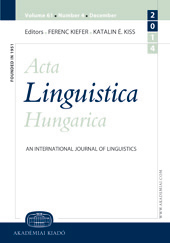A typology of Hungarian time adverbs
A typology of Hungarian time adverbs
Author(s): Aniko CsirmazSubject(s): Theoretical Linguistics, Finno-Ugrian studies
Published by: Akadémiai Kiadó
Keywords: aspect; duration; divisibility; adverbial modification; time interval;
Summary/Abstract: Hungarian has a number of apparently synonymous time adverbs that can measure the duration of time intervals. The paper explores these adverbs in some detail, and argues that contrary to appearances, none ofthem are freely interchangeable. The starting point is a discussion of the property of homogeneity that time adverbs are sensitive to. The paper argues for a specific treatment of homogeneity and a preliminary adverb definition based on that treatment. It is proposed that some, but not all, Hungarian time adverbs share the default definition. The diverging adverbs may (a) contain a covert frequency predicate or (b) not measure the duration of the time interval directly, but by determining an endpoint of the interval. Hungarian time adverbs also differ in the range of time intervals they can measure; some, but not all adverbs can measure all available time intervals including the event, iterative, habitual and reference time. This variability in time adverb modification is arbitrary and needs to be explicitly determined for each adverb. Apart from discerning the interpretation of Hungarian time adverbs, the conclusions have a more general impact. On the one hand, apparently homogeneous adverbs can have disparate definitions. On the other, it is necessary to permit explicit, arbitrary constraints on adverbial modification. It is also argued that time adverbs can impose non-local restrictions on the eventuality modified, strengthening the need for a powerful theory of adverbial modification.
Journal: Acta Linguistica Hungarica (Since 2017 Acta Linguistica Academica)
- Issue Year: 53/2006
- Issue No: 3
- Page Range: 249-289
- Page Count: 41
- Language: English

